|
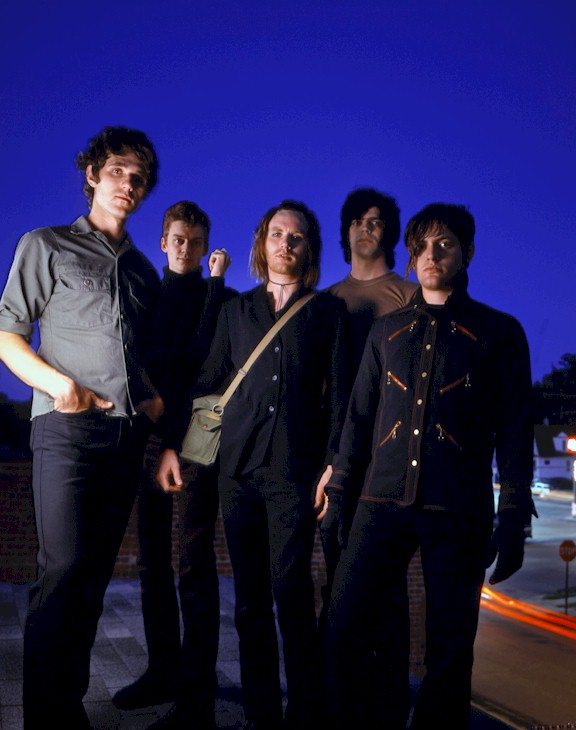
The Faint: men in black
story by tim mcmahan
photographs by bill
sitzmann
|
|
|
Lazy-i: August 15, 2001
|
There is nothing in Omaha or elsewhere
quite like The Faint, and they know it.
Their ultra-stylized live shows have enough panache to transform even
the bleak, wood-paneled, linoleum-floored confines of Sokol Underground
into a be-seen-style glossy, New York City dance club. It's not done with
smoke and mirrors. More like smoke and light and heat, and a
digital-pulsed rhythm that throbs in syncopation with the black-clad lads'
every twitch, their bodies bent in strobe-lit silhouette behind racks of
keyboards, wires and gear.
Their stage show is a flawless marriage of tune and technology, driven
by a style of music that is at once familiar to anyone who listened during
the bad-hair days of New Wave electronic pop to bands like Human League,
Berlin, Thomas Dolby, Front 242; a style that carried on into the '90s
with dance-house acts like Depeche Mode, New Order and The Cure. But
though comparisons can be made -- and always are -- nothing from the
Reagan-era on or since has really sounded like The Faint's brand of dark,
sleek, digitally driven rock.
It is high-style anywhere, but especially in a state that takes pride
in comparing itself to choice cuts of meat cooked "rare, well
done." The Faint is an oddball outfit, too sleek to recognize how
sleek it is, denying fashion while at the same time setting it.
Ask them if they realize how image is obvious in everything they do --
from the music to their fluid live shows, from the gay-goth CD artwork to
their strange space-med Web site -- and they'll say, "we wear black
because it looks good under the lights." Ask Todd Baechle, the band's
lead vocalist/synth player about the recent addition of Clockwork
Orange-style make-up, and he'll tell you he's been wearing it for the past
two years and it "doesn't have much to do with the shows."
They say there is no style in their substance, and they're right. Their
substance is style, from the moment the lights drop on stage and the
single heart-beat-paced strobe begins to flash like a midnight fashion
beacon calling all units to the dance floor for some healthy sweating. |
|
|
If you expect an extension of their
flat-black cool to permeate their real world lives, think again. Image
ends when you cross the entrance to their small house located near The
California Bar in a neighborhood that used to be known for its whore
traffic.
The Baechle brothers -- Todd and drummer Clark -- and bassist Joel
Petersen are nothing like the style-tortured souls they portray on stage.
Todd talked about the band lying either facedown or on his back in a black
beanbag chair, rarely touching his new, extension-laden hair. A
black-mopped Clark, meanwhile, leaned back and laughed on the couch while
Petersen thoughtfully plugged in the necessary data that the other two
left out. The only residue from their stage personas was their wrinkled
black clothes, the band's pseudo-uniform suitable for daywear as well as
night. Guitarist Mike Dappen and synth player/programmer Jacob Thiele, who
round out The Faint, were wisely absent; one of them apparently busy
making posters promoting the band's Friday night CD release party at the
Sokol Auditorium with Bright Eyes and Cursive, maybe the most-hyped show
of the year, and with good reason.
With the release of Danse Macabre, their new full-length on
Saddle Creek Records, The Faint are poised -- whether they like it or not
-- to break through that invisible boundary that keeps all the good, cool
bands in check to be heard only by the in-the-know audiophiles who
actively search out the "next big thing" that's too good to play
on the radio. Danse Macabre, nine songs of pure, electronic dance
fuel wrapped in a grim, post-modern facade, will be embraced by the unholy
masses. Given even a smidgen of a chance, it could be this decade's Cars
first album.
Let's start with their live show, an eerie kaleidoscope of colored
strobes wrapped in thick bass tones. Through the chaos is a sense of cool
order. There's nothing improvised here, and if there's criticism to be
had, it's that their live set is too short and too choreographed. When
Todd yells, "that's all we have" after the band's typical
30-minute set, he means it. They literally are unable to play another song
because the entire show is preprogrammed, following a click track in
Clark's ear that ties it all together.
"The lights are sequenced to the click track, so we have to sit
down and think about what we're going to do with them," said Clark,
wearing a skin-tight I Am Spoonbender T-shirt. "Before our last tour
we didn't have a whole lot of time before the album was done to get songs
ready to play live, so we just made sure we had 10 songs that worked
really well."
"We may change the order," Todd said, "but everyone
knows what's going to happen every night before we step on the
stage." He said the lack of spontaneity from their standpoint didn't
really matter. The audience wouldn't know, unless they caught a show early
in the tour.
As for the shortness of the set, that's a Faint tradition that harkens
back to their last album, which was more of an extended EP than an LP.
"As we play bigger places, we're expected to play longer sets,"
Todd said. "But we'll never be the band that plays too long. We just
don't have that much material."
The band has only recorded three albums, of which only two contain
music that's appropriate for their current incarnation. Plus, those two
are only about 30 minutes long. Their debut, 1998's Media, utilized
guitars -- not keyboards -- with songs that only vaguely resemble their
current style. Media tracks like "Some Incriminating
Photographs" and "Typing: 1974-2048" with their kinder,
gentler melodies and Todd's craning vocals, cast vague shadows of things
that were to come.
"We listened to Media today," Todd said. "We like
bits and pieces of it. We talked about taking Media songs and
giving them current-day Faint arrangements. We're afraid it might not fit
with the current tone." |
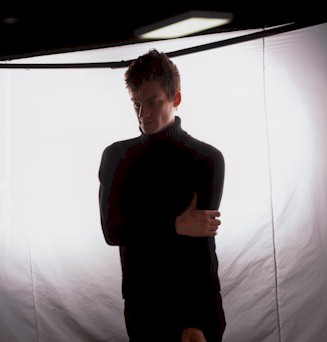
|
"Neither album is
all about sex or death, but there is sort of a death theme this time." |
|
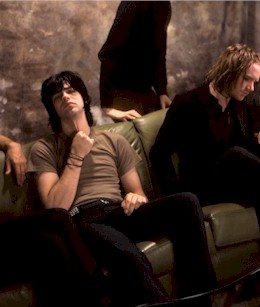
|
|
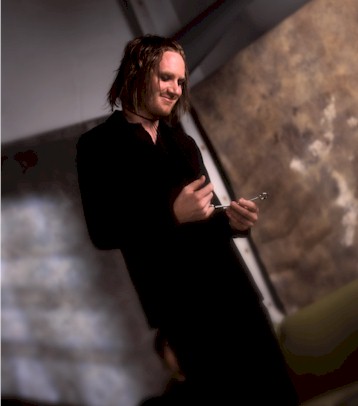
|
"Everyone there
was hard to take. I didn't fit in. They were really short-sighted --
they could be best friends one day and then kick each other's doors
in and scream all night the next." |
|
|
The band ditched their guitars for
synthesizers for 1999's Blank Wave Arcade, the CD that ultimately
would define their sound. Depending almost solely on digital
instrumentation, Blank-Wave Arcade was a study in electronic
minimalism, with production techniques that took advantage of open spaces
and rooms mic-ed to sound like the band was playing in a garage, Clark
said. The final product matched the décor. While listeners went ga-ga for
the band's neu-retro synth stylings, melodies took a back seat to effects,
leaving your head spinning for 20-odd minutes only to wake up in a
static-colored room.
Danse Macabre is a whole 'nother monster.
The difference both in sound and musical style is a slap in the face
right from the opening track, "Agenda Suicide," which sports the
darkest, bleakest sing-along chorus laid over the band's patented
minor-key voice-of-doom-in-a-jumpsuit synth counter-melodies. And, of
course, an irresistible house-dance rhythm track. The hyper-kinetic whirl
of "Glass Dance" comes on like a video-game-colored rave
soundtrack, but with irresistible, undeniable hooks. "Let the Poison
Spill from Your Throat" and "Your Retro Career Melted"
carry a distinct Some Great Reward-era Depeche Mode punch.
The fireworks, however, don't reach maximum height until midway through
the CD. The streamlined "Poised to Death," is a sassy
head-shaker, while "The Conductor," a song the band has opened
its set with since they began touring this summer, is a regal, minor-key
dance anthem, complete with vocoder-distorted vocals (just like Neil
Young's Trans, for you old-timers) and orchestral-quality piano
tones. Next, Todd's portrait of life on the edge, "Violent,"
marries stark, grim images of violence and murder with Sputnik-tinged
synth pings and an ever-throbbing thump-thump-thump house beat that'll
keep anyone shaking it. CD closer "Ballad of a Paralyzed
Citizen" takes advantage of a gorgeous cello line played by Cursive's
Gretta Cohn to set the stage for one last dark fable, with the opening
lines: "I'm paralyzed and things could change for you as well /
You're not so bad off now, you can move anything you need."
There's no denying the grim themes that run through the entire CD, but
even with the predominately minor-key music, the dance beats overpower any
feelings of gloom.
"When we were recording Blank Wave Arcade we wanted a
dirtier live sound," Petersen said. "With this one we wanted a
clean, electronic feel. The two things we were thinking were 'make it
darker and dancier.'"
"It's not like we're tired of Blank Wave, we still play it
a lot," Todd said. "But the mix is better on the new one and we
don't get tired of darker songs as much as the really poppy ones off Blank
Wave."
Maybe the band also got tired of singing about sex, the theme that
dominated most of Blank Wave Arcade's lyrics. "Rather than
analyzing different things about sex, this one sort of does that with
death," Todd said. "Neither album is all about sex or death, but
there is sort of a death theme this time."
Many of the lyrics reflect his experiences. "Violent," for
example, reads like a diary of his days when he was shacking up in the
Overland Hotel, a pay-by-the-day flophouse hidden in the heart of the Old
Market. The lyrics are bleak: "Months went by and doors got kicked
in / Two outlaws collecting what they loaned / In a room beside my walls /
A girl gets choked."
Baechle said he ended up at the Overland after living in a mid-town
house with 20 people. "It was a madhouse," he said. "I
wanted to be alone, without a phone. I was working at Homer's (an
independently owned Omaha record store) at the time and didn't have a car
that would take me any place. It was $50 a week or $200 a month, and close
to work.
"Those things in ('Violent') really happened," he said.
"Everyone there was hard to take. I didn't fit in. They were really
short-sighted -- they could be best friends one day and then kick each
other's doors in and scream all night the next."
Todd lived in Hotel Hell for four or five months, before buying the
house he now lives in with the band. He also quit his day job at Homer's.
In fact, none of the band members have jobs anymore. "With the amount
of touring and practicing we have to do, there wasn't time to do jobs and
whatnot," Petersen said. "We'll be on the road touring through
mid-October." |
|
|
He said the band continues to draw larger
crowds. "The quality of shows has improved along with the bands we
share the bill with," Petersen said. "Having a booking agent is
by far one of the smartest things we've done as a band. But at the same
time, I booked one tour and learned some extremely valuable lessons, even
though it sucked."
"It took a long time before people started showing up at our
shows," Todd said. "It really didn't start happening until Blank
Wave Arcade came out. I don't think we were very good then. As we've
gotten a little better, we've gotten more people to the shows."
"If you're on your first tour, you can't be pissed that no one
knows who you are," Clark said. "We once played in front of no
one in Athens, Ga."
Those days are long gone. The band already has played to packed clubs
around the country, including two sold-out shows at Omaha's Sokol
Underground (facilitating moving Friday's show to the upstairs auditorium
with a capacity of more than 1,000). Press includes write-ups on Spin,
Paper, Alternative Press and the College Music Journal.
And that's just the tip of the iceberg.
Does the future hold guest spots on TRL with Carson Daly while
throngs of black-dressed club kids huddle outside the glassed-in MTV New
York studios? Not likely, the band says, but it may be out of their hands.
"We're not trying to get popular," Todd said. "I think
radio sucks and I'm not going to jump through hoops to get on it."
He yawned and put a CD in the stereo. "We don't want to be
millionaires. I don't know what we'd do with the money."
Back to 
Published in The Omaha Weekly August 15, 2001. Copyright ©
2001 Tim
McMahan. All rights reserved.
Photographs copyright © 2001 by Bill
Sitzmann, used by permission.
|
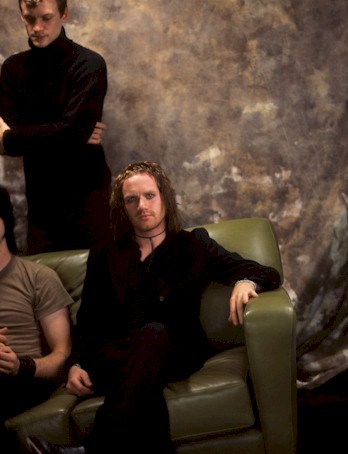
|
"I think radio sucks and
I'm not going to jump through hoops to get on it."
|
|
|
|

![]() webboard
interviews
webboard
interviews